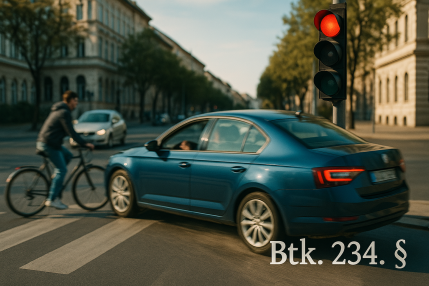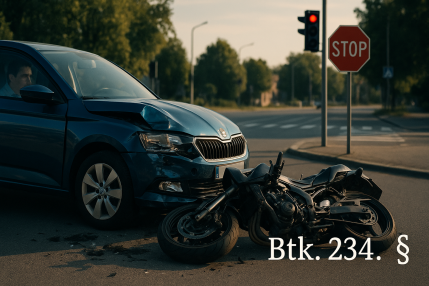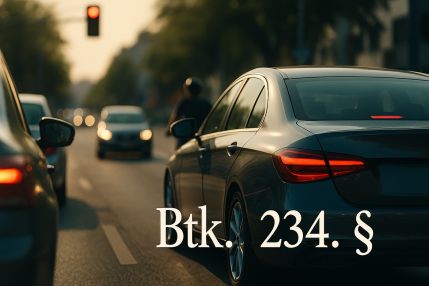Traffic is an integral part of everyday life, yet even a moment of carelessness or a deliberate violation driven by anger may lead to criminal prosecution. The offence carries serious legal consequences, particularly where it results in bodily injury or death.
Traffic regulations (KRESZ) include both mandatory rules (such as stop signs or solid lines) and rules requiring judgment (such as selecting an appropriate speed).
Violation of a mandatory rule makes it easier for the court to establish intent, since there is no room for discretion. For rules requiring judgment, however, it must be examined whether the driver was aware that their conduct created a direct and immediate danger.
The offence applies only if the violation occurs on a public road or on a private road open to public traffic. Conduct on a closed private road does not in itself constitute this crime.
Endangerment of road traffic can only be committed on a public road or a private road open to public traffic.
An offence on a closed private road generally does not fall under this category, unless it results in serious bodily harm or death. Section 240 (1) of the Criminal Code extends liability to such cases.
The danger must be direct, meaning that the harmful outcome could occur immediately as a result of the violation. The risk must be concrete and directed at a specific person or situation.
For instance, if a driver deliberately maneuvers so that another vehicle can avoid collision only by emergency braking, this qualifies. Abstract or hypothetical risks are not sufficient.

Only intentional violations can constitute this offence. Intent means that the driver:
knows of the rule,
deliberately breaches it,
and recognizes that this act directly endangers the physical integrity of others.
Negligent behaviour, such as failing to notice a red light because of glare, does not qualify. However, deliberately driving through a red light may constitute the crime.

A driver may rely on experience or the technical capacity of their vehicle, believing no harm will result. If this reliance is objectively justified, liability for this offence may not arise, as the driver acted with reckless negligence rather than intent.
However, violations of mandatory rules (such as red lights or stop signs) always give rise to liability.
If the offender deliberately seeks to frighten or harm another person—for example, as retaliation—then additional offences such as bodily harm or homicide may apply, depending on the outcome. In such cases, traffic merely serves as the means of committing the crime.

There must be a causal link between the violation and the outcome. If injury or death occurs due to unrelated circumstances, the offence may not be established—though it may aggravate sentencing.

The offender can only be a person subject to traffic regulations, i.e. a driver. Driving without a licence does not exempt them from liability.
The victim (passive subject) may be any other person. Even if several persons are endangered, it is treated as one offence.

The penalties are more severe where the offence results in:
serious bodily harm → imprisonment from one to five years,
permanent disability, serious health damage, or a mass accident → imprisonment from two to eight years,
death → imprisonment from five to ten years,
multiple deaths or a fatal mass accident → imprisonment from five to fifteen years.
Permanent disability refers to the irreversible loss of a bodily or mental function, such as the ability to see, hear, walk, or reproduce.
It also includes the loss of a limb, permanent paralysis, miscarriage caused by the offence, or irreversible mental impairment.

Serious health damage covers long-term or incurable conditions requiring recovery of at least six months.
A mass accident requires at least one person suffering serious injury and nine additional injured persons. A fatal mass accident requires at least one death and nine additional injured persons.

According to Supreme Court guidance, the offender’s intent may extend only to creating danger. For aggravated results (serious injury, death), liability is typically based on negligence, unless the offender explicitly intended the outcome—in which case other crimes such as homicide apply.
If additional crimes are committed alongside the traffic violation, liability arises for both. For example, steering a vehicle at a police officer may constitute both endangerment of traffic and violence against an official.
Failing to assist an injured person may also result in liability for failure to provide assistance.
Endangerment of road traffic is a strict criminal category with severe consequences. Intentional violations that directly endanger others can trigger prosecution under Section 234 of the Criminal Code, especially when serious results occur.
In such cases, seeking immediate legal assistance is essential. An experienced criminal lawyer can assess the circumstances and develop the best possible defence strategy.
This article is for informational purposes only. It does not constitute legal advice and does not substitute for personalized consultation with a qualified attorney.
